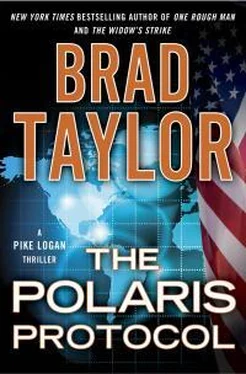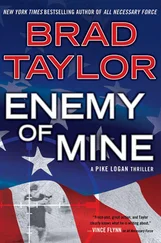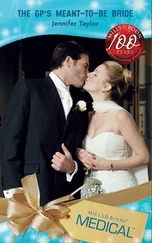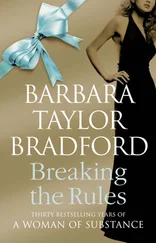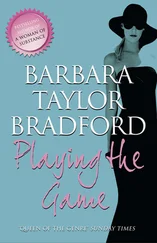It looked like his guess had been wrong, just as he’d been wrong about Booth’s having nothing to do with the team that had been chasing them. A miscalculation he regretted. Booth was the only connection, the only common denominator, and somehow they’d managed to find him twice. First in Tepito, then at the museum.
Booth wasn’t working with the team; of that the sicario was sure. For one, during the attack in Tepito, after initially showing tenacious resolve, the man and woman on the team had abruptly quit the chase, letting them escape. Two, Booth had run away screaming at the museum. If he’d thought they were there to rescue him, he would have stayed, happy for them to appear. Instead, the assault had surprised him as much as anyone else.
Even so, he was sure they were tracking him, and Arthur Booth knew the reason why. Had known they might be coming again and had said nothing. The sicario regretted not flaying the man for answers. Booth had lied to him, which was reason enough to kill him, but he also now had information that could never get out. He knew the sicario’s real name.
The sicario watched one more cab arrive without result and decided to leave. Clearly, Booth wasn’t coming to the United States embassy for help. The sicario mentally kicked himself for allowing the man to keep his passport.
Identification was necessary to enter the museum, and so the sicario had given Booth his passport just prior to entering. He’d kept the man’s wallet but had failed to retrieve the passport after they’d entered. Booth had no money or the ability to get any, but now he had the means to flee the country.
Knowing Booth’s fear and lack of ability to do anything in the city—especially without any money—the sicario had figured he would show up here, spinning some story about being mugged or kidnapped and asking to return to America, but it looked like that idea had been misplaced hope. There had been a steady stream of people moving inside to the first security checkpoint, but none were Booth.
Perhaps the team is working with the embassy. Maybe this is why he hasn’t shown. He is as afraid of them as he is of me.
The man had to be somewhere, though, and the sicario understood his intelligence. While he might have been a blubbering mass of cowardice, he was smart. He wasn’t wandering the street looking for a handout. He was working hard to find another way to get home.
How? How would he do that?
The sicario stood and walked away from the embassy, flagging down an unregistered cab. He climbed in back, seeing two men in the front, both disheveled and dirty. He gave them the name of a store and settled back, thinking of the ramifications.
If Booth were captured by the team or anyone else, the sicario had no illusions that he wouldn’t give up his real name as soon as he opened his mouth. Doing anything to keep himself out of jail for his theft of computer secrets. That would close down the sicario’s only escape route. His island of protection from Los Zetas. He now had plenty of money to live on for the rest of his life, but he couldn’t use it if the American authorities were hunting him. He wouldn’t be able to get a driver’s license, open a new bank account, or do any of the mundane things required to live in the United States.
Beyond that, Booth had lied to him and had fled. The sicario could not let that stand. He had one thing he did well, one thing that made him what he was, and Booth had spit on that skill. For that, he would die.
The sicario was brought out of his thoughts when he felt the cab stop. He glanced out and saw they were nowhere near his destination. The cab had parked in an alley between two warehouses. The sicario understood why.
The man in the passenger seat said, “What happened to your arm?”
The sicario noticed his makeshift bandage had begun to leak crimson, the wound he’d received at the museum slowly seeping through.
“I was hurt at work. Why did you stop here?”
The man flashed a kitchen knife with a six-inch blade. “Hand over your money. Maybe I won’t carve your other arm.”
The sicario closed his eyes. The violence followed him everywhere. He wasn’t the fox. He was the hen. An animal that attracted death. Why did they come for him? Was it God’s plan or another unconnected event on his path in life? A sign of what was to come or just an echo, like thunder in a storm?
He dearly wanted to know.
When he opened his eyes again, the man in front wavered, shrinking from the glare. The driver said, “Give us your wallet. Do it now!”
The sicario reached behind his back, and the man with the knife relaxed. Instead of a wallet, the sicario withdrew his pistol, placed it on the forehead of the knife wielder, and pulled the trigger, spraying the windshield with blood and brain matter.
The explosion was huge inside the closed vehicle, the smoke and smell of burned powder filling it. The driver held up his hands, saying, “No, no. Please don’t.”
The sicario said, “Move over. Get in the passenger seat.”
The driver sat still in fear. “Don’t, please. Don’t kill me.”
“Move over. Now.”
“Why? Why why why?”
The sicario pressed the barrel into his head and said, “Because I’m taking this car and I don’t want to drive sitting in blood. Move.”
The driver began to cry, but he opened the door and pushed the body to the pavement. He turned around and said, “We weren’t going to hurt you. Please, I have a wife. A daughter.”
The sicario paused, intrigued. He placed his black eyes on the man and asked, “What does that have to do with anything? Would having a wife and daughter prevent a fox from killing your chickens?”
The driver was confused by the statement. He opened his mouth to speak, his lips sliding over his teeth, but no words came out. He looked at the sicario in fear, willing to say anything to prevent what was coming but having no idea what words would succeed. The sicario was disappointed. Another man who had no answers. He pulled the trigger, shattering teeth and severing the spinal cord. The sicario pushed him out of the seat, letting the body flop on top of the other man’s. He closed the door and backed out of the alley, the front tire rolling over an outstretched arm.
He was unsure of his exact location, not having paid attention during the drive, and gave up trying to find the store he’d given them. Instead, he began circling the neighborhood, looking for the familiar black and yellow sign.
He made several left turns and was growing frustrated when he saw what he wanted: a small grocery store with a placard advertising Western Union.
He parked on the side, the passenger door pinned in by a wall to prevent some curious passerby from seeing the mess in the front seat. The store was empty, making his job infinitely easier. He turned and locked the front door, then went to the counter.
The woman behind it had seen his actions, and when she saw his destroyed visage, she shrank back, praying under her breath.
He said, “I’m not here to harm you. I want to withdraw a transfer from Western Union.”
She nodded rapidly in relief and said, “I need the MTCN and your first and last name.”
He said, “Arthur Booth, but I have no MTCN. What is that?”
“The money transfer control number. It’s the number the person sending it should have given you so you could receive it.”
He leaned into the counter and said, “I just want to know if a man named Arthur Booth received money. Can you check for me?”
Trembling, she said, “I’m not allowed to do that. Please.”
He stared at her for a moment, then said, “Is that what you really want to tell me?”
A man outside rattled the handle of the door, then knocked. The sicario said, “Don’t turn this into violence. Check for me, please.”
Читать дальше
